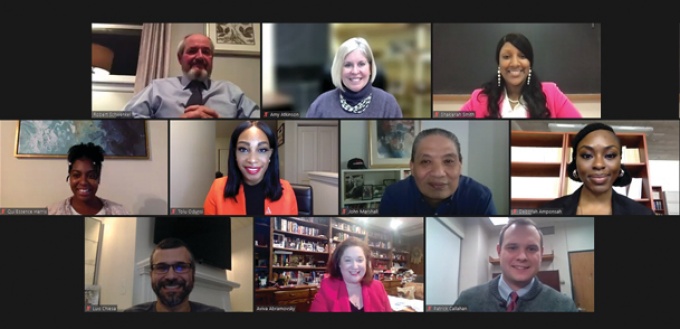
Growing Up Marshall
As our nation celebrated Black History Month and the achievements of African Americans throughout U.S. history, UB School of Law students had a rare opportunity to hear from the son of the first African-American jurist to serve on our nation’s highest court.
In a Feb. 3rd webinar, organized in honor of Black History Month, John W. Marshall—a leader in law enforcement and public safety and son of Justice Thurgood Marshall—shared memories of his father’s groundbreaking career. Justice Marshall served on the court from 1967 to 1991 and died in 1993; he’s also remembered for his extensive civil rights advocacy work, including arguing the critical Brown v. Board of Education case before the high court in 1954.
The presentation, “Growing Up Marshall: Life, Legacy & Lessons Learned,” was presented by the law school, the Bar Association of Erie County and Fried, Frank, Harris, Shriver & Jacobson LLP, a global law firm headquartered in New York City.
Speaking from the family’s home in northern Virginia, John Marshall began with some childhood stories, including the time as a young teenager when he desperately wanted a minibike and thought his father had given in—only to be presented instead with a box full of law books, carefully annotated to show that minibikes weren’t street-legal and required a driver’s license. More seriously, he remembered the cohorts of Justice Marshall’s law clerks who were often invited to dinner, and the enthusiastic young clerk who went on to become dean of Harvard Law School, U.S. solicitor general and ultimately a U.S. Supreme Court justice, Hon. Elena Kagan.
As an elementary school student, Marshall said, his father would sometimes misbehave. As punishment, the principal sent him to the school basement and told him to memorize sections of the Constitution. “Little did they know,” he said, “that they were preparing a future justice of the Supreme Court.”
After being turned down by the University of Maryland law school because of the color of his skin, Marshall entered law school at Howard University. There, he met his mentor, Dean Charles Hamilton Houston, who went on to become the first general counsel of NAACP, and who pushed Marshall to achieve. “I never worked hard until I got to the Howard law school and met Charlie Houston,” Justice Marshall once said. “I saw this man’s dedication, his vision, his willingness to sacrifice, and I told myself, you either shape up or ship out.”
Describing his father as “a man who spent over 60 years of his life always standing up for something,” John Marshall spoke about the Brown case. “There were a lot of doubters,” he said, “people that were encouraging my dad not to take that case on. It wasn’t time, they said; ‘if you lose, then the policy doctrine of separate but equal will be cemented firmly as the foundation of the country. We can’t take that chance.’ And my dad argued back saying, ‘Well, if not now, then when? We’re going to do this.’”
The result, of course, was historic, establishing the precedent that separate-but-equal is not equal at all. But Justice Marshall refused to take full credit, pointing instead to the “unsung heroes” of the civil rights era. “Many times, the people who insisted on their day in court, many of them lost their jobs, lost their homes and some even lost their lives,” John Marshall said. “They would always accompany my dad to the train station when he would leave to go back to New York City, and my dad told me how he would look out the window at them and feel guilty at what might happen to them as a result of him arguing their case. He told me, those are the real heroes.”
The movie Marshall, partly filmed in Western New York, gave rise to another story. John Marshall told of a small screening they had at which his mother was present. They held their breath, unsure how she would react. And afterward she said: “You know, that Chadwick Boseman is an incredibly good-looking man, but he is nowhere near as handsome as my husband was.”
Marshall closed the program, reminding the students in attendance of his father’s words: “The battle for racial and economic justice is not yet won; indeed, it has barely begun. The legal system can force open doors and sometimes even knock down walls, but it cannot build bridges. That job belongs to me, to you, to all of us.
“Our nation can do it. Afro and white, rich and poor, educated and illiterate, our fates are bound together. We can run from each other, but we cannot escape each other. We will only attain freedom if we learn to appreciate what is different and muster the courage to discover what is fundamentally the same.”
Third-year student Shakierah Smith ’22 was instrumental in arranging John Marshall’s appearance; other participants in the presentation included Dean Aviva Abramovsky, Professors Luis Chiesa, vice dean for diversity, equity, and inclusion, and Tolu Odunsi, as well as Robert Schwenkel ’82 of Fried Frank, and law students Deborah Amponsah ’22, Patrick Callahan ’22 and Qui-Essence Harris ’23.
Student editors of the Buffalo Law Review are planning to reprint Marshall’s remarks in the May issue of the journal.